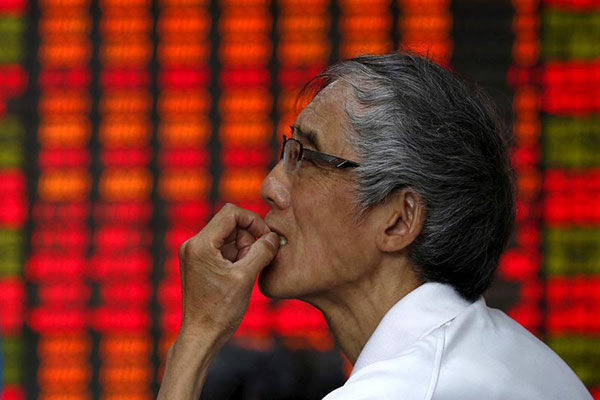 |
|
An investor looks at an electronic board showing stock information at a brokerage house in Shanghai, July 10, 2015.[Photo/Agencies] |
Recent turbulence in the stock market caused a rout and left the market confidence and trade volume low. While the slide forced domestic investors to wonder whether the bull has left the bourse, foreign institutional investors began to bulk up their portfolio of Chinese stocks.
More than 10 foreign institutional investors, such as Hillhouse Capital, Vanguard Group, BlackRock, Deutsche Bank and Fidelity Investment, have expressed interest in acquiring more Chinese stocks, and are positive about the market's long-term perspective, according to an interview by Shanghai Securities News.
Hong Kong's top Chinese stock market future fund, Southern A 50, received 186 million units' buy order worth 2 billion yuan on July 27, as Shanghai Composite Index plunged a record 8.48 percent. Most buy order came from long-term foreign institutional investors.
Hillhouse Capital, one of the largest QFII investors, increased its exposure in the Chinese stock market, as the market dropped 8.48 percent; Hillhouse Capital generally holds stock for five to seven years. "Major market adjustment is our opportunity to buy in," according to Hillhouse Capital Chairman Zhang Lei.
Vanguard Group was granted a 10 billion yuan RQFII quota in April. In June, Vanguard Group integrated the Chinese stock market into its Global Emerging Market Structural Investment Fund; the fund manages over $69 billion.
"We will enter Chinese stock market in the second half of 2015, we already gave our timetable to the Securities Commission," said Lin Xiao Dong, CEO of Greater China region of the Vanguard Group, "We are positive about A share's long-term prospective."
An analyst at Deustsche Bank sees a rosy side of Chinese economy, that China's GDP may return to 7.2 percent at the fourth quarter, benefiting from a stronger stimulus package, infrastructure investment and recovery of the property market.
People's Bank of China's easing measures are crucial to market recovery, said Stephen Roach, a Yale professor. PBOC's emphasis is on its role of oversight, and keeping benchmark interest rates well above zero. Therefore, it has more control over monetary policy compared to other central banks.
PBOC's oversight role and set of specialized easing measures for stock market?reduce financial risk caused by overflow liquidity to other equity market, according to Stephen Roach.
Government intervention and easing measures are necessary when a huge fluctuation hits the stock market and may cause a liquidity crisis, Zhang said.
He said that many governments will roll out a series of easing measures or policies to combat short-term fluctuation.
US?limited institutional investors short sold stock and the Hong Kong government increased the deposit rate, raised overnight interest rates from 8 percent to 23 percent and bought over $15 billion worth of shares.
"All the easing measures are only a temporary fix, the market will correct itself in long term." Zhang added.
